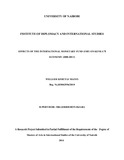| dc.description.abstract | The effectiveness of monetary policy on economic growth in Kenya. The International Monetary Fund (IMF or the Fund) is an organization of 188 countries, working to nurture global monetary cooperation, protect financial stability, expedite international trade, stimulate high employment and viable economic growth, and moderate poverty around the world. The data collection tools for the secondary data that was cast-off were information collecting, and document investigation. This technique largely involved literature research. Data collected in this procedure comprised of; opinions, quotations and precise knowledge and background information concerning to the IMF on Kenyan economy. The study finds that economic development does not respond to fiscal policy shocks indicating that there are other factors that influence the economic growth in Kenya. The study also finds the interest rate channel followed by the credit channel to be the most operational channels in influencing economic growth | en_US |

